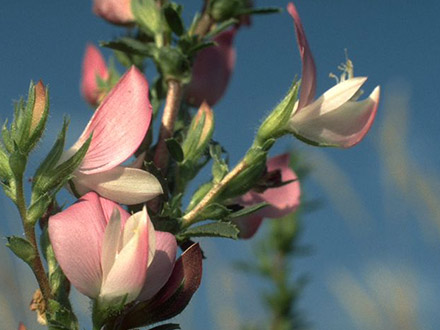Botanical name
Ononis spinosa L.
Family
Fabaceae
Common name
Spiny restharrow, Restharrow
Information about the plant
Spiny restharrow is a European plant with a sub-oceanic distribution. It ranges from France (excluding the Atlantic coast) in the west to Poland and Romania in the east, north to southern Scotland and southern Scandinavia, and south to the Pyrenees and central Italy. It typically grows along woodland edges, roadsides, and in dry meadows.
The genus name Ononis is derived from the Greek ‘onos’ (= donkey), because the young leafy shoots emit an unpleasant ‘goat odor’. The species epithet spinosa refers to the sharp thorns (Latin ‘spinosus’ = full of thorns).
Spiny restharrow is a 20 to 60 cm tall perennial plant that stands in the meadow as a ‘hard’ plant with numerous upright branches that are woody and spiny at the base. The leaves are small and elongated; the butterfly-shaped flowers are pink and form loose clusters. The flowering time is in June and July. The fruits grow into 2 cm long, softly hairy pods.
Medicinally used parts of plants (herbal drug)
The dried roots (Ononidis radix) are used.
The commercially available drug is sourced from wild collections in Southeast Europe.
Constituents of the herbal drug
Spiny restharrow root contains triterpenes, isoflavonoids, and sterols.
Quality of the drug
The quality of spiny restharrow root (Ononidis radix) is specified in the European Pharmacopoeia (Ph. Eur.).
Medical applications
Recognised medical use
The HMPC has classified spiny restharrow root as a traditional herbal medicinal product (see ‘Traditional use’).
ESCOP: For flushing the urinary tract in inflammatory diseases and renal gravel, and as an adjuvant treatment of bacterial infections of the urinary tract.
Traditional use
Spiny restharrow root has been classified by the HMPC as a traditional herbal medicinal product (Article 16a of Directive 2001/83/EC). Based upon long-standing use, spiny restharrow root can be used to increase the amount of urine to achieve flushing of the urinary tract, as a supportive treatment for mild urinary tract complaints.
Herbal drug preparations in finished dosage forms
- Chopped or coarsely powdered spiny restharrow root for tea preparation
- Dry extracts in tablets and instant teas
- Alcoholic extracts in liquid preparations
Dosage
Tea: Drink a cup of spiny restharrow root tea 2 to 4 times a day. Daily dose 6 to 12 g of the drug. It is advisable to combine with other drugs such as goldenrod, Java tea leaves, birch leaves, or nettle leaves (bladder and kidney tea, urine tea).
Preparation of a tea
Pour approximately 150 mL of boiling water over 2 to 3 g of finely chopped or coarsely powdered spiny restharrow root and strain after 20 to 30 minutes.
Notes
During flushing therapy, it is essential to drink sufficient fluids.
In the case of edema due to impaired heart and kidney function, flushing therapy with spiny restharrow root should not be performed.
No safety studies are available on the use of spiny restharrow root during pregnancy and lactation. The use in children under 12 years of age is not recommended due to a lack of evidence.
Side effects
None known.
Interactions
None known.
References
Herbal drug monographs
Further literature
Commentary on the European Pharmacopoeia (Spiny restharrow root, No. 1879).


